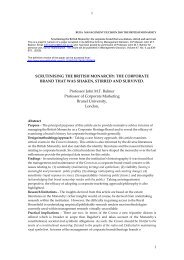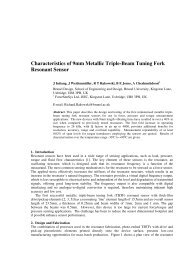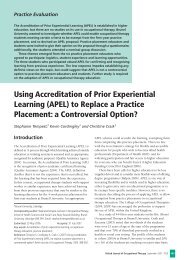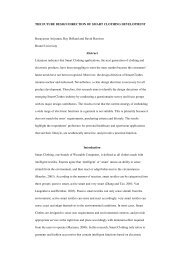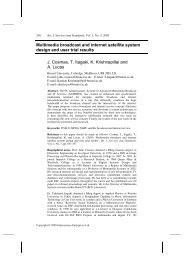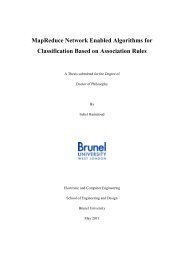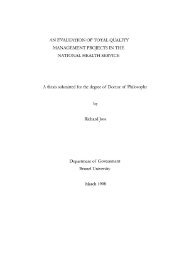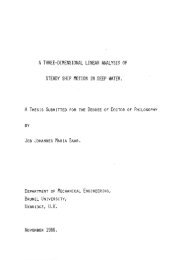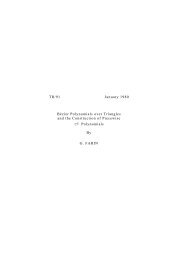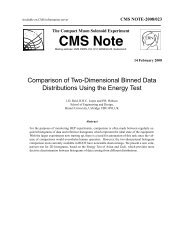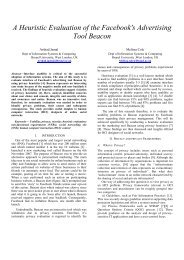- Page 1 and 2: FACTORS AFFECTING E-GOVERNMENT IMPL
- Page 3 and 4: Abstract, Acknowledgement, Table of
- Page 5 and 6: Abstract, Acknowledgement, Table of
- Page 7 and 8: Abstract, Acknowledgement, Table of
- Page 9 and 10: Abstract, Acknowledgement, Table of
- Page 11 and 12: Abstract, Acknowledgement, Table of
- Page 13 and 14: Abstract, Acknowledgement, Table of
- Page 15 and 16: Abstract, Acknowledgement, Table of
- Page 17 and 18: Chapter 1: Introduction to the Rese
- Page 19 and 20: Chapter 1: Introduction to the Rese
- Page 21: Chapter 1: Introduction to the Rese
- Page 25 and 26: Chapter 1: Introduction to the Rese
- Page 27 and 28: Chapter 1: Introduction to the Rese
- Page 29 and 30: Chapter 2: Literature Review Chapte
- Page 31 and 32: Chapter 2: Literature Review resear
- Page 33 and 34: Chapter 2: Literature Review et al.
- Page 35 and 36: Chapter 2: Literature Review ―Alt
- Page 37 and 38: Chapter 2: Literature Review Table
- Page 39 and 40: Chapter 2: Literature Review Connec
- Page 41 and 42: Chapter 2: Literature Review citize
- Page 43 and 44: Chapter 2: Literature Review legacy
- Page 45 and 46: Chapter 2: Literature Review Bélan
- Page 47 and 48: Chapter 2: Literature Review and ac
- Page 49 and 50: Chapter 2: Literature Review range
- Page 51 and 52: Chapter 2: Literature Review precis
- Page 53 and 54: Chapter 2: Literature Review implem
- Page 55 and 56: Chapter 2: Literature Review 2.7.5
- Page 57 and 58: Chapter 2: Literature Review Litera
- Page 59 and 60: Chapter 2: Literature Review majori
- Page 61 and 62: Chapter 3: Conceptual Model 3.1 E-g
- Page 63 and 64: Chapter 3: Conceptual Model change
- Page 65 and 66: Chapter 3: Conceptual Model associa
- Page 67 and 68: Chapter 3: Conceptual Model 3.1.3 T
- Page 69 and 70: Chapter 3: Conceptual Model evaluat
- Page 71 and 72: Chapter 3: Conceptual Model process
- Page 73 and 74:
Chapter 3: Conceptual Model Priorit
- Page 75 and 76:
Chapter 3: Conceptual Model but whi
- Page 77 and 78:
Chapter 3: Conceptual Model Awarene
- Page 79 and 80:
Chapter 3: Conceptual Model Leaders
- Page 81 and 82:
Chapter 3: Conceptual Model E-gover
- Page 83 and 84:
Chapter 3: Conceptual Model challen
- Page 85 and 86:
Chapter 3: Conceptual Model 3.2.1.1
- Page 87 and 88:
Chapter 3: Conceptual Model Davis e
- Page 89 and 90:
Chapter 3: Conceptual Model Perform
- Page 91 and 92:
Chapter 3: Conceptual Model Many sc
- Page 93 and 94:
Chapter 3: Conceptual Model 3.2.2.6
- Page 95 and 96:
Chapter 3: Conceptual Model Table 3
- Page 97 and 98:
Chapter 3: Conceptual Model Employe
- Page 99 and 100:
Chapter 4: Research Methodology 4.1
- Page 101 and 102:
Chapter 4: Research Methodology The
- Page 103 and 104:
Chapter 4: Research Methodology 1.
- Page 105 and 106:
Chapter 4: Research Methodology 4.4
- Page 107 and 108:
Chapter 4: Research Methodology (20
- Page 109 and 110:
Chapter 4: Research Methodology 4.5
- Page 111 and 112:
Chapter 4: Research Methodology 4.6
- Page 113 and 114:
Chapter 4: Research Methodology met
- Page 115 and 116:
Chapter 4: Research Methodology The
- Page 117 and 118:
Chapter 4: Research Methodology The
- Page 119 and 120:
Chapter 4: Research Methodology Res
- Page 121 and 122:
Chapter 4: Research Methodology emp
- Page 123 and 124:
Chapter 4: Research Methodology 4.8
- Page 125 and 126:
Chapter 5: Case Study Findings Chap
- Page 127 and 128:
Chapter 5: Case Study Findings The
- Page 129 and 130:
Chapter 5: Case Study Findings Mini
- Page 131 and 132:
Chapter 5: Case Study Findings Tabl
- Page 133 and 134:
Chapter 5: Case Study Findings - Cr
- Page 135 and 136:
Chapter 5: Case Study Findings Fina
- Page 137 and 138:
Chapter 5: Case Study Findings The
- Page 139 and 140:
Chapter 5: Case Study Findings gove
- Page 141 and 142:
Chapter 5: Case Study Findings The
- Page 143 and 144:
Chapter 5: Case Study Findings To c
- Page 145 and 146:
Chapter 5: Case Study Findings 5.4.
- Page 147 and 148:
Chapter 5: Case Study Findings achi
- Page 149 and 150:
Chapter 5: Case Study Findings The
- Page 151 and 152:
Chapter 5: Case Study Findings The
- Page 153 and 154:
Chapter 5: Case Study Findings main
- Page 155 and 156:
Chapter 5: Case Study Findings 5.4.
- Page 157 and 158:
Chapter 5: Case Study Findings gove
- Page 159 and 160:
Chapter 5: Case Study Findings Tabl
- Page 161 and 162:
Chapter 5: Case Study Findings Tabl
- Page 163 and 164:
Chapter 6: Survey Research Findings
- Page 165 and 166:
Chapter 6: Survey Research Findings
- Page 167 and 168:
Chapter 6: Survey Research Findings
- Page 169 and 170:
Chapter 6: Survey Research Findings
- Page 171 and 172:
Chapter 6: Survey Research Findings
- Page 173 and 174:
Chapter 6: Survey Research Findings
- Page 175 and 176:
Chapter 6: Survey Research Findings
- Page 177 and 178:
Chapter 6: Survey Research Findings
- Page 179 and 180:
Chapter 6: Survey Research Findings
- Page 181 and 182:
Chapter 6: Survey Research Findings
- Page 183 and 184:
Chapter 6: Survey Research Findings
- Page 185 and 186:
Chapter 7: Discussion and Research
- Page 187 and 188:
Chapter 7: Discussion and Research
- Page 189 and 190:
Chapter 7: Discussion and Research
- Page 191 and 192:
Chapter 7: Discussion and Research
- Page 193 and 194:
Chapter 7: Discussion and Research
- Page 195 and 196:
Chapter 7: Discussion and Research
- Page 197 and 198:
Chapter 7: Discussion and Research
- Page 199 and 200:
Chapter 7: Discussion and Research
- Page 201 and 202:
Chapter 7: Discussion and Research
- Page 203 and 204:
Chapter 7: Discussion and Research
- Page 205 and 206:
Chapter 7: Discussion and Research
- Page 207 and 208:
Chapter 7: Discussion and Research
- Page 209 and 210:
Chapter 7: Discussion and Research
- Page 211 and 212:
Chapter 8: Conclusion and Further R
- Page 213 and 214:
Chapter 8: Conclusion and Further R
- Page 215 and 216:
Chapter 8: Conclusion and Further R
- Page 217 and 218:
Chapter 8: Conclusion and Further R
- Page 219 and 220:
Chapter 8: Conclusion and Further R
- Page 221 and 222:
Chapter 8: Conclusion and Further R
- Page 223 and 224:
Chapter 8: Conclusion and Further R
- Page 225 and 226:
PhD. References Al-Shafi, S. & Weer
- Page 227 and 228:
PhD. References Bose, R. (2004) E-g
- Page 229 and 230:
PhD. References Creswell, J. W. & C
- Page 231 and 232:
PhD. References Fligstein, N. (1985
- Page 233 and 234:
PhD. References Horton, R. P., Buck
- Page 235 and 236:
PhD. References Kijsanayotin, B., P
- Page 237 and 238:
PhD. References Meyer, J. W. & Rowa
- Page 239 and 240:
PhD. References Reddick, C. G. (200
- Page 241 and 242:
PhD. References Suh, B. & Han, I. (
- Page 243 and 244:
PhD. References West, W. (2005) Adm
- Page 245 and 246:
PhD. Abbreviations ICT Information
- Page 247 and 248:
Appendix A: Interview Agenda Templa
- Page 249 and 250:
Appendix A: Interview Agenda Templa
- Page 251 and 252:
Appendix A: Interview Agenda Templa
- Page 253 and 254:
Appendix B: Questionnaire Survey in
- Page 255 and 256:
Appendix B: Questionnaire Survey in
- Page 257 and 258:
Appendix C: Questionnaire Survey in
- Page 259 and 260:
Appendix C: Questionnaire Survey in




